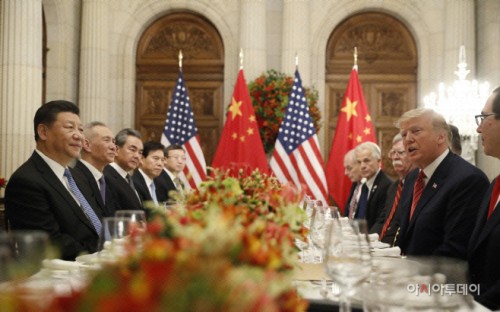 |
| US president Donald Trump (right) and Chinese president Xi Jinping (left) at a working dinner after the G20 leaders’ summit in Buenos Aires, Argentina on March 1./ Source: Yonhap News |
By AsiaToday reporter Choi Won-young
As the United States plans to hike tariffs on another $325 billion in Chinese imports following its 25% tariff hikes on $200 billion Chinese goods, uncertainty in business is growing among South Korea’s export-reliant companies.
In the wake of the escalating US-China trade tensions, the won-dollar rates rose more than 3.5 percent while the domestic stock market plunged more than 5 percent in a month. The bigger problem is that the trade dispute between the world’s top two economies will be more intense in the next four weeks, which may worsen business environment uncertainty.
The Korea International Trade Association (KITA) said Sunday Korea’s total exports are expected to decline by nearly 1 trillion won ($870 million) with the recent US move. Such economic damage could be incurred by declines in the exports of intermediate goods, such as semiconductors and chemical products. The KITA said the damage would grow even bigger, considering the global economic downturn.
Previously, the US increased tariffs on 5,745 Chinese items worth $200 billion to 25% from the current 10% starting Friday after trade talks held in Washington ended without any results. The US also set a one-month deadline for China to seal a trade deal or face additional 25% tariffs on a further $325 billion in exports to the US.
“If such measures continue, Korean companies exporting products to the United States with production base in China and those companies exporting products originating in China from South Korea to the US will be burdened with tariffs,” said the KITA’s trade business support group. “However, as tariffs may change depending on the progress of the US-China negotiations, relevant companies need to carefully see how things go and adjust the timing of shipment.”
South Korea is heavily reliant on the two nations. Out of its total export destinations, China and the US accounted for 38.9 percent last year. This is why the US-China trade war is a blow to South Korea. According to the KITA, the country’s gross domestic product (GDP) is expected to decline by $174 million if China’s GDP falls by 0.2%. If the United States’ GDP declines by 0.1%, South Korea’s GDP is expected to decline by $62 million. Besides, the world’s top two economies account for 40% of the world GDP. Therefore, it is difficult to estimate the decrease in exports due to the global economic recession. As a result, the won-dollar exchange rates soared to 1,182 won on Friday. Experts say the rates could rise to 1,200 won level. If the value of the won rises, the competitiveness of exporting companies declines. As the volatility of the exchange rate increases, the business stability of the companies decreases.
Being aware of the seriousness of the issue, the government has decided to take emergency response. Immediately after the US-China trade negotiations on Friday, the government opened a private and public joint emergency meeting and decided to pour some 322 billion won from a revised extra budget into trade finance and overseas marketing, and began analyzing the effects on various export industries.
“The South Korean economy is highly dependent on exports to China, and there is a great concern about the slowdown of the Chinese economy,” said Kim Yoon-kyung, an analyst at the Korea Economic Research Institute. “If the US-China trade war begins in earnest, the economy will face steep downturn despite China’s pump-priming policy. At the enterprise level, it is hard to respond to international situations. The government should prepare an environment so that the South Korean companies are able to quickly adapt to new trade environments and enter new industries.”
#US-China trade war #tariff hike #Korea #export
Copyright by Asiatoday
Most Read
-
1
-
2
-
3
-
4
-
5
-
6
-
7





















